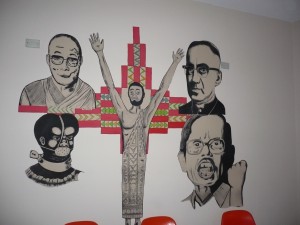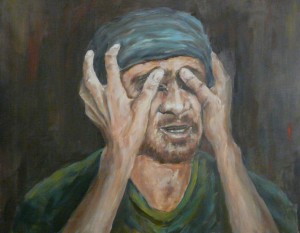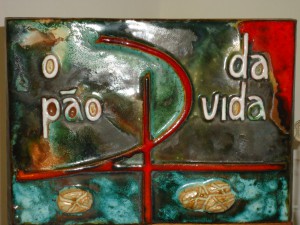Last Sunday the gymkhana was performed with the theme: “we are called to live young.” It was organized by the coordinators of youth of the parish of Santo Domingo and aimed to promote integration, encouraging youth engagement in the way of faith and building the Kingdom of God through the civilization of Love.
During the meeting and as a proposal for the month of vocations, some stalls were organized by the Comboni Missionaries, Salesian Sisters, Brothers of Saint Gabriel and Lay Comboni Missionaries.
The organization of the gymkhana began with the Mass in the community of San Judas, the offertory of the Mass has been donated to the settlement Rosa Leon as a concrete gesture of action: “I come to do, with pleasure, your will Lord.”
America
Free to listen and to speak
A commentary on Mk 7, 31-37 (XXIII Sunday O.T., September 6th 2015)
Mark, in today’s reading, portrays Jesus in “pagan” country, where people were not following Jew religion. But, beyond the religious differences between those people and the people of Nazareth or Jerusalem, there it was a concrete, real man with a concrete, human problem, that is the same for believers and unbelievers, rich and poor, educated and illiterates. That man was deaf and could not speak properly, something that affected his human condition at a very fundamental level.
Moreover, it seems clear that what Mark intends with the narration of this experience is to explain to us what the real mission of Jesus is:
Jesus’ mission consists in using the power-love of God (symbolized by the continuous touching with fingers and hands) to liberate humanity, not so much from our physical deafness, but, more important, from our deep inability to understand God and our neigbours, closed up in our own sterile pride. From that deafness comes up also our inability to say meaningful words to others.
When I was a young priest, I have known a ten years old boy, whom everybody thougth he was both deaf and mute, till young nun started to give attention to him, accompanying him with a great, continuous and constant love. After some time, she discovered that the child had a physical problem with his ear and took him to the doctors. Solved that problem, the child began to hear the words spoken to him and to repeat them, learning how to listen and how to speak. I was then very much impressed by the power of love, able to start off processes of liberation and healing.
Certainly, not always happens that way, rather in most cases deaf people have to learn how to do without spoken words. But, again, as in the Gospel, the reference is not so much the physical deafness, but that close heart that leads us to close the channels of communication and loving relationship with the members of our family or our community, with people of other cultures, political ideas or religious practices…
Quite often we become “deaf” and “mute” in the deepest side of our personality: we refuse to listen to what other people have to tell us… and for that same reason we are not able to say any “relevant” word to tem or to others: we do not have a sincere, meaningful, liberating word to say, because we do not listen.
We remember the story of Emmaus: Jesus approaches the disciples, walks with them and listen to them. Afterwards he would say clarifying and meaningful words.
Sometimes, it seems that our Christian communities have become deaf and mute: They do not listen to the cries of our humanity (Migrants, refugees, young people, women…, nor to the prophets or our time, those people who can help us to understand God’s ways for today. And because of this deafness they become also “mute”, unable to announce any meaningful message to today’s humanity.
A missionary Church is a church that listens, free from the deafness of his pride and arrogance. Only after that liberation, can it become truly missionary, messenger of the good news of God’s love for people.
In the Eucharistic celebration, Jesus “touches” our body. Let us pray that He heals our deafness and liberates our tongues so that we can become true missionaries, healed and instruments of healing, while we continue walking in life towards a fuller communion with God and our fellow men and women.
Fr. Antonio Villarino
Roma
The big crisis: The scandal of human fragility
A commentary on John 6, 60-69; XXI Sunday of O.T., August 23th, 2015
 We read today the last part of John’s chapter sixth, the same we have reading for five Sundays. The chapter somehow has a dramatic ending, with a big crisis, that leads the disciples to abandon Jesus. That is why I think it very important for us to meditate on this reading, since most of us pass, in a way or another, through similar crisis. On my side I offer two reflections:
We read today the last part of John’s chapter sixth, the same we have reading for five Sundays. The chapter somehow has a dramatic ending, with a big crisis, that leads the disciples to abandon Jesus. That is why I think it very important for us to meditate on this reading, since most of us pass, in a way or another, through similar crisis. On my side I offer two reflections:
1.- Where does the scandal stay?
The disciples accuse Jesus of say “hard words”. For long time, this “hardness” was explained as the difficulty to accept Jesus’ words understood in a literal sense of “eating his flesh and drinking his blood”. But we know, by now, that Jesus speaks in the context of Hebrew culture and biblical language. In this context, it’s clear that to “eat his flesh” means to believe in the divine presence in his humanity and to “drink his blood” means to accept his life given up on the Cross, out of obedience and love.
But it’s precisely here where we find the scandal that became the big crisis. Many could not accept the image of God as it was revealed in Jesus. For them God is powerful, owner of everything, always triumphant, somebody to be afraid of… And that should be the same with His Messiah. But Jesus presented Himself as the human incarnation of a different image of God: Someone that welcomes sinners gives priority to the healing of a sick man rather than to the sacredness of the Sabbath, someone that appears as fragile and looser on the Cross, someone that shares the experience of death…
Many good people found this totally unacceptable. They were happy with Jesus as a marvellous teacher, they agreed with his plan to renew religion, they were moved by his power over sickness and bad spirts… But now Jesus was going too far. He was proposing a deep change in their image of God. Now He was proposing to leave aside all hypocrisy and falsehood, to accept that they themselves were sinners and fragile, and to allow God to become their companion, someone that wanted to share their fragility and from that deep solidarity to heal the root of their stupid pride. That was the real scandal.
2.- What about us? Where does our scandal stay?
We all pass for experiences that scandalize us. I think that what really scandalizes us it’s not something theoretical or an intellectual “mystery” that we do not understand in our mind. Certainly, there are aspects of the revealed truth that sometimes we do not understand and that we should try to understand better through studying and spiritual deepening. But, on my opinion, the real scandal that prevents us from believing and accepting Jesus totally is our own fragility (personal and social); what scandalizes us it’s the reality of sin (in the Church and outside it); we are scandalized by our own sins and failures, by the failures of the Church, by the failures of society. We are scandalized by a God that does not act as magician to resolve our many problems; we are scandalized by this Jesus, poor and humble, who fails on the cross and at the same time trust in the Father, in solidarity with so many poor, sick and sinners.
But, against our scandal, this is the biggest gift that, according to John, makes the disciples who believe become children of God. This faith liberates me, so that I do not have to “demonstrate” nothing to anybody, I do not have to lie to myself and to others as if I never made a mistake. People obsessed to be always wright end up by being hypocrites and to live in falsehood. On the contrary, Jesus accepts the human fragility, the failure and even the death. And, in doing so, He acts as what He really is: the SON, unconditionally loved and able to love unconditionally.
To believe this is to enter into communion with Jesus, to “eat his flesh” and with him find the way to the fullness of the Father’s love and live. Do not believe it’ s not to “eat”, not to enter in communion with him and to remain in the lie and falsehood of the one that tried to deceive Adam as if He were a God by himself and not in obedience to the Father.
All of us, in a moment of our life, have to go through this crisis: Do I pretend to be like Adam, a false “god”? Do I pretend to be like the prodigal son thinking that I am going to be more autonomous and happier away from the Father? Or do I accept myself, in my fragility, and accept the solidarity of Jesus, who descends with me into the river Jordan of this my fragility and with me rises to the communion with the Father?
To go to take communion regularly means to say yes to the last question and to renew our trust in Jesus and his Father, in spite and through the continuous experience of the many sins and fragilities in ourselves and in others.
P. Antonio Villarino
Rome
The true Bread of life: beyond the outward appearance
A commentary on John 6, 24-35: XVIII Sunday OT: August Second 2015
We go on Reading John’s chapter sixth, which we began to read last Sunday about the sign of abundant bread. Well, from one Sunday to another we jump over a part that speaks about Jesus who disappears from the view of the satisfied crowd, crossing over to the other side of the Lake, and people looking from Him feverishly. What we read today is precisely the answer Jesus gives to people’s search. And in that answer John explains to us the faith of those first disciples in Jesus as the true living Bread.
To understand this answer, I propose a few brief reflections on the various and inter-connected meanings of bread the biblical tradition:
1.- Bread (nourishment) sustains our physical life
There’s an experience among the first ones to mark the history of Israel: that they were able to feed themselves in an extraordinary way and in one of the most difficult moments of their march towards the Promised Land, when in the desert there was no food around. We all know the story of the “mana”; we do not know what exactly happened, though scholars have their theories about its physical feasibility. But the important thing is that whatever happened allowed the people to survive physically and that Israel always saw in that extraordinary experience the presence of the providing God.
I think that something similar happens to us many a time, even if not so extraordinary: When in despair, we find a job that allows to keep up the family, our business starts to go well, we receive an unexpected help, overcame a serious sickness… On those cases we may think that fortune has smiled to us or that we were smart enough to merit that positive outcome… Or we may think that God is guiding history in our favour, using even fortune and our own hard work. This is what the Hebrews thought and what many simple people continue thinking today, with a faith that takes them beyond superficialities and appearances.
2.- From Bread to the Word-Law
When Moses brought the Law to the people in the Sinai, then Israel made the experience that the Law was as big a gift as the physical nourishment in the desert. With the Law the people could organize themselves, make progress, find a way forward in the many moments of doubt, and find harmony, happiness and sense. So little by little Israel began to apply to the Law the same meaning of salvation that had given to the bread in the desert: “not only on bread do human beings live, buy also on any word that comes out of God’s mouth”.
I think that we make an equal experience, individually and as communities. Sometimes we seem to despise the value of laws, but we know that a good Law makes a nation better. Without laws, a nation falls down on anarchy and usually that situation favours the powerful and violent against the poor and peaceful. So to have a good law (or a personal project of life) is as important as to have nourishment.
3.- From the Law to the Word-Wisdom
But Law is not the unique manifestation of that divine wisdom that was guiding the people. There were also the prophets, psalmists, and poets, philosophers from other cultures, religious and political, leaders, wise old men and women… Every manifestation of wisdom was considered, together with the Law, as BREAD for the spirit.
We too need to be nourished by every type of wisdom that humanity produces through science and philosophy, religions and arts…Every positive thinking, every luminous word can help us to live better.
4.- From the Word-Wisdom to Jesus Christ
The disciples’ experience with Jesus is wat is explained in today’s gospel: The bread that nourishes in the desert is no more than an image of Jesus as the true Bread that nourishes our spiritual life. His words, his nearness to sick people and sinners, his entire person is like the Bread in the desert, the Law of Moses, the highest Wisdom of humanity. In Him we find the fullness of that Life that God wants for all his children.
Certainly, we all want our basic need (bread, dress, and roof) covered and Jesus –as the Church today- worries and cares about these basic needs, but He does not remain there; He invite sus to eat the true Bread of Word-Wisdom-Love of God made flesh in Jesus of Nazareth.
To accept this, to “eat” it and make it be part of our life, it’s to open ourselves to a deeper life, able to overcome whatever desert we’ll have to cross.
Fr. Antonio Villarino
Roma
Bread to cross the dessert: the impossible becomes possible
A commentary on John 6, 1-15 (XVII Sunday of O.T.: July 26th 2015)

Let us remember that in the Sundays of this liturgical year we are reading the gospel of Mark and that we have reached chapter six. Last Sunday we saw Jesus deeply moved before a crowd of people that were like “sheep with no shepherd”. Today we should go on reading from the same chapter of Mark what is known as “the multiplication of bread”.
But, for this episode, the Liturgy has preferred to offer, for this and the next four Sundays, the reading of John chapter six, that is quite rich in theological references. This Sunday we start off with the first fifteen verses. We can read them personally and try to get its meaning for each one of us today. On my part, I put forward make two points of meditation:
1.- Jesus as the new Moses
John begins his story in quite a solemn way. It’s evident that he means that what he is going to say is very important. There are at least three elements that mark this “solemnity”:
– Jesus from the lake climbs up to the mountain. We all know that the mountain, in biblical language, is much more than just a geographical incident. To go up the mountain reminds us, among other stories, of Moses going up the Sinai, where he had that extraordinary revelation of God as liberator and “chief” of his people.
-When He is on the top of the mountain Jesus “sits down” with his disciples. The gesture speaks of Jesus as the Master with an authority that nobody else ever had. As Moses received on the Sinai Mountain the Law for his people, Jesus teaches on the mountain the new Law, the Word received from the Father.
-The Passover, the feast of the Jews, was near. We know that the Passover, Easter, was the feast in which the memory of the liberation was made, the identity of the people was strengthened and hope was renewed for a new and definitive liberation.
What John is going to tell us in this chapter six of his gospel has to be placed in this solemn set of theological references.
For he disciples, and for us now, Jesus is not an ordinary “rabbi”, nor one of many prophets or somebody who wanted to purify and renew the ethical levels of society… He is the Eternal Word of God that enlightens like a lamp in the night; He is the bread that nourishes us in the dessert of life; He is the new Moses, who, coming down from the mountain, leads the people and sustains it on the way to freedom and full life. He is the centre of the new Passover, the new alliance with the Father for the life of all.
2.- The impossible made possible
John says that Jesus asked Philip how to do to nourish so many people in an isolated place. And Philip gave him the only possible answer: it’s no possible. All of us would have given the same answer, as we really do in front of so many difficulties and problems with no apparent solution.
Philip was right, but it seems that he has forgotten the history of his own people: to nourish a crowd in an isolated place is impossible, as it was impossible that a tiny people could have been liberated from the power of the Pharaoh; or that this same people would be able to cross the dessert and not die on the intent… But the experience of Israel is that God made all this possible, so that indeed it was liberated, it did cross the dessert, and it did reach the Promised Land.
But we should not think that God acted as a kind of “magician”. It is something more simple and deep: When we allow God to go with us and we do our own part, the powerful give way, waters divide themselves, bread is enough, injustice is overcome, conflicts give way to reconciliation and new levels of brotherhood are possible, till the will of God is fulfilled “on earth as it’s on heaven”.
When we confront problems with faith, hope and charity, the impossible becomes possible, as it has happened so many times in universal history and in our own personal life. When we take part in the Eucharist all this is celebrated and made actual.
Fr. Antonio Villarino
Roma







